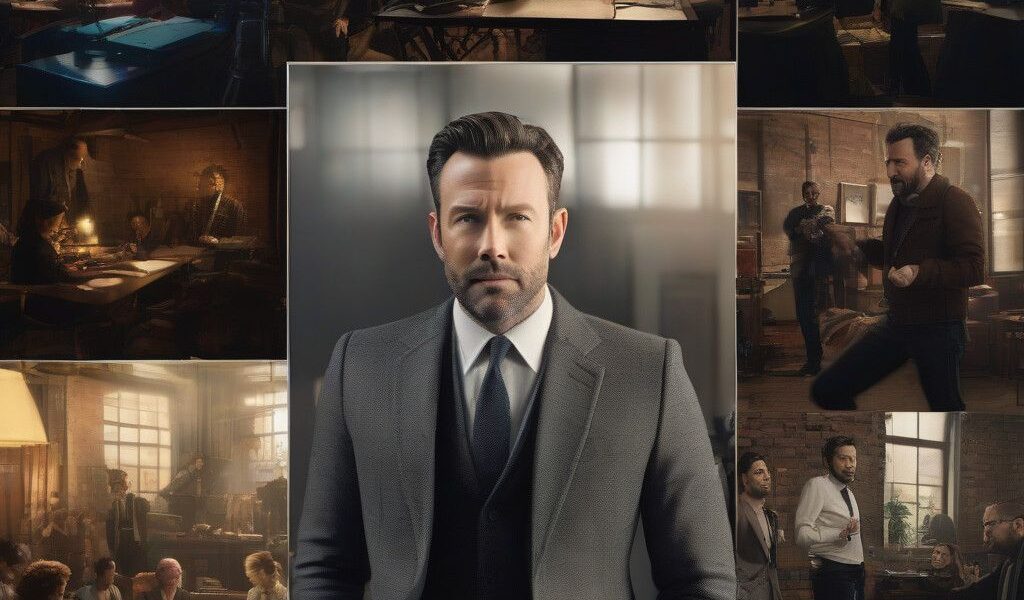AI in Hollywood: Ben Affleck’s Perspective on Human Creativity and Technology
In the realm of entertainment, the integration of artificial intelligence (AI) has sparked considerable debate. Prominent figures in Hollywood, including actor and filmmaker Ben Affleck, have offered their insights into how this technology may impact the industry. While some express concerns about AI potentially replacing creative roles, Affleck stands firm in his belief that human creativity remains irreplaceable.
Affleck recently shared his thoughts during an interview with CNBC, where he addressed the growing anxiety surrounding the use of AI in film and television. Many industry professionals worry that AI could take over tasks traditionally executed by human actors and screenwriters. Affleck, however, believes that while AI can mimic various styles, it fundamentally lacks the depth and nuance that characterize genuine storytelling and acting. He likened this capability to a cheap imitation rather than a true reflection of human artistic expression.
The actor knows the film industry from different angles, especially since he co-founded a film studio with fellow actor Matt Damon. This perspective allows him to see the potential benefits of AI in Hollywood. For example, Affleck posits that AI could ultimately generate new creative opportunities. As the technology continues to evolve, it may assist human creators in brainstorming ideas, generating unique content, or enhancing post-production processes. By streamlining certain workflows, AI could afford artists more time to focus on the creative aspects of filmmaking.
However, Affleck did not shy away from acknowledging the significant disruptions that AI could bring, particularly to the visual effects sector. This industry segment has already begun experiencing the impacts of advanced technologies, leading to fears of job loss among visual effects artists. Strikes by Hollywood unions over the past year highlight the seriousness of these concerns, demonstrating that creative professionals are rightfully worried about their job security in an AI-influenced landscape.
Despite these apprehensions, Affleck remains skeptical about the idea of AI completely overtaking the roles of actors and screenwriters. Storytelling, he argues, is an inherently human domain that relies on personal experiences, emotions, and the nuances of culture that AI cannot replicate effectively—at least not yet. This sentiment resonates with many professionals in the creative fields, emphasizing the profound connection between human experiences and artistic expression.
To underscore his point, consider the work of film directors like Martin Scorsese or Ava DuVernay, who have highlighted the importance of human elements in crafting compelling narratives. Their films often draw upon rich character development, emotional arcs, and social contexts that AI, despite its technical capabilities, cannot fully comprehend or reproduce. These filmmakers rely on deeply personal insights that arise from distinct cultural backgrounds and lived experiences, which are critical to true storytelling.
In contrast, AI can serve as a valuable tool to support creative processes. For instance, AI algorithms can analyze viewer preferences and recommend personalized content, thus informing creators about audience tastes. This data-driven approach can help studios make informed decisions regarding project development and marketing strategies. AI’s analytical capabilities can additionally enhance audience engagement, further bridging the gap between creators and viewers.
The collaborative potential of AI and human creativity offers a promising avenue for the future of filmmaking. By leveraging AI’s strengths while maintaining the intrinsic human elements of storytelling, content creators may find innovative ways to enrich the audience experience. For example, AI tools could assist in scriptwriting by generating drafts based on specific parameters set by the writers, allowing for a more efficient creative process.
Furthermore, as Affleck indicated, the evolving nature of AI means that it is more likely to create new roles rather than diminish existing ones. The emergence of AI specialists and technicians who work alongside artists could lead to a hybrid model where human creativity and technological innovation coexist. By cultivating a collaborative environment, the entertainment industry may harness the best of both worlds, resulting in fresh narratives and innovative visual experiences.
In conclusion, Ben Affleck’s perspective on AI in Hollywood underscores the ongoing conversation about the balance between technology and creativity. While concerns about job security in the creative professions are legitimate, the notion that AI could simply replace human roles is an oversimplification of a complex issue. As AI evolves, it is crucial for the industry to find ways to integrate this technology into the creative process while appreciating the unique contributions that human artists bring to the table.
The future may hold exciting possibilities as the boundaries between technology and artistry continue to blur, but one thing remains clear: storytelling, enriched by the human experience, will always be at the heart of Hollywood.








